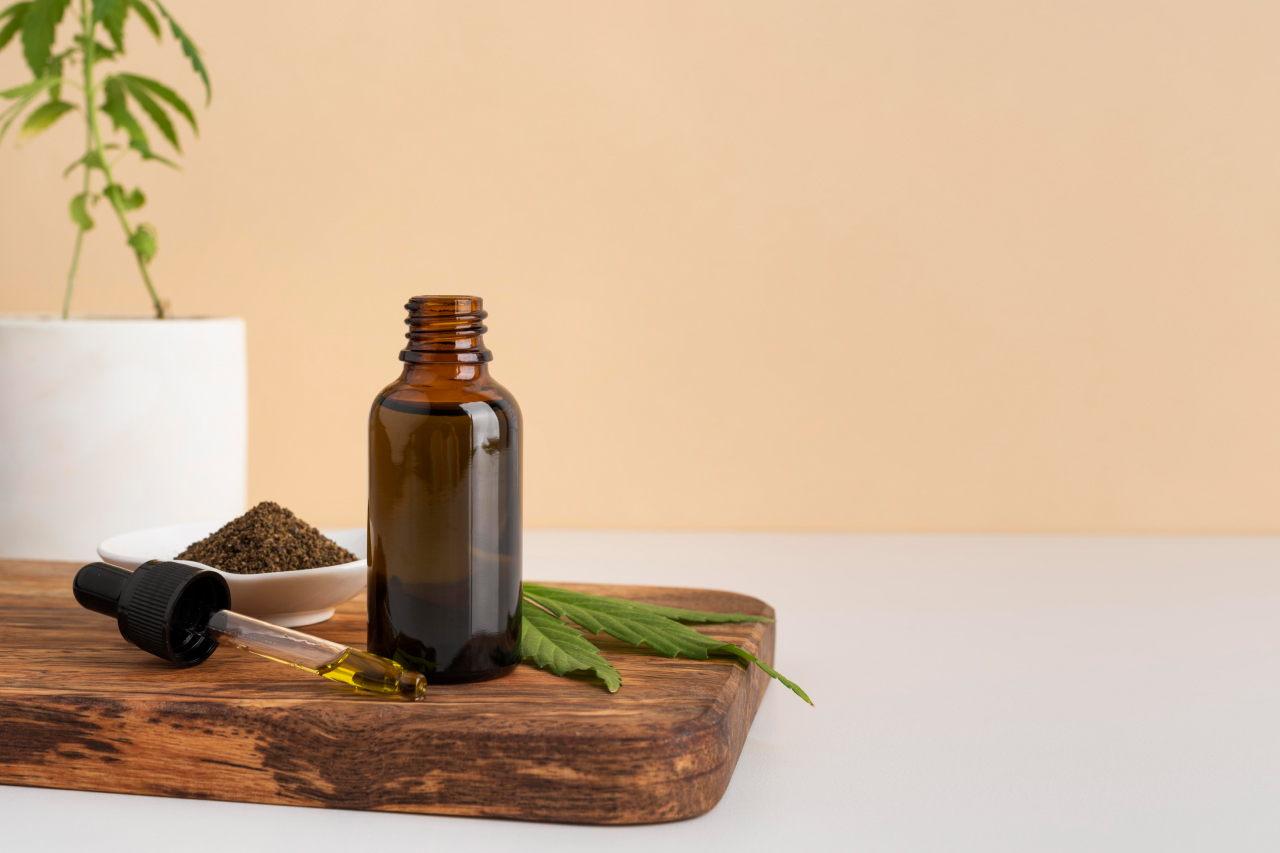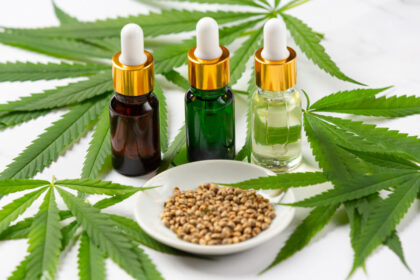In recent years, the world of cannabis and its derivatives has undergone a significant transformation.
As society’s perception of these substances evolves and as more states and countries legalize their use, it’s essential for consumers to have a clear understanding of the two most prominent compounds found in the cannabis plant: CBD and THC.
This article will delve into the seven fundamental differences between CBD (cannabidiol) and THC (tetrahydrocannabinol), shedding light on their distinct properties, effects, and potential benefits.
Whether you’re seeking therapeutic relief or recreational enjoyment, knowing how to choose between these two compounds is crucial to make informed decisions about your health and well-being.
Join us as we explore the world of CBD and THC, helping you navigate the intricacies of these fascinating compounds and discover which one is right for you.
CBD
CBD, or cannabidiol, is one of the many compounds, known as cannabinoids, found in the cannabis plant.
It is a naturally occurring chemical that has gained significant attention and popularity in recent years due to its potential therapeutic properties.
Unlike its more famous cousin, THC (tetrahydrocannabinol), CBD is non-intoxicating, which means it doesn’t produce the “high” typically associated with cannabis use.
CBD is believed to interact with the body’s endocannabinoid system, a complex network of receptors and neurotransmitters that play a crucial role in regulating various physiological processes, including pain perception, mood, immune function, and more.
While research on CBD is still in its early stages, it has shown promise in providing potential health benefits.
Some of the areas where CBD has been studied for its potential effects include pain management, anxiety and stress reduction, anti-inflammatory properties, and even as an adjunct therapy for certain medical conditions.
CBD is available in various forms, including oils, capsules, topical creams, and edibles, making it accessible to consumers seeking its potential benefits in different ways.
It’s important to note that the effectiveness and safety of CBD can vary depending on the source, dosage, and individual factors, so it’s advisable to consult with a healthcare professional before using CBD for specific health concerns.
THC
THC, or tetrahydrocannabinol, is a psychoactive compound found in the cannabis plant.
It is the primary cannabinoid responsible for the intoxicating effects or “high” associated with cannabis use.
When it is consumed, it binds to specific receptors in the brain and central nervous system, leading to alterations in perception, mood, and cognitive functions.
Its psychoactive properties can induce feelings of euphoria, relaxation, altered perception of time, and an increased sense of sensory perception.
These effects can vary depending on the strain of cannabis, method of consumption, and individual tolerance.
In addition to its recreational use, it also has potential medical applications.
It has been studied for its ability to alleviate symptoms in conditions such as chronic pain, nausea and vomiting, muscle spasms, and certain neurological disorders.
However, the psychoactive nature can limit its appeal for some patients, leading to the development of medical cannabis strains with controlled levels or alternative non-intoxicating cannabinoids.
It’s important to note that the legality varies from one location to another, and its recreational and medical use may be subject to strict regulations and restrictions in many regions.
Users should be aware of the legal status and potential risks associated consumption in their specific area.
CBD vs. THC
Here are 7 key differences between (cannabidiol) and (tetrahydrocannabinol), along with explanations for each:
Psychoactivity
CBD, or cannabidiol, and THC, or delta-9-tetrahydrocannabinol, are both compounds found in the cannabis plant.
However, they have different effects on our bodies, including psychoactivity.
THC is the primary psychoactive compound in cannabis and is responsible for the “high” sensation commonly associated with marijuana use.
When it interacts with receptors in the brain, it activates the endocannabinoid system, leading to various psychological and physical effects.
On the other hand, CBD does not produce psychoactive effects.
It binds very weakly, if at all, to cannabinoid receptors in the brain, resulting in no intoxicating effects.
Instead, CBD interacts with other receptors, such as serotonin and vanilloid receptors, which may contribute to its potential therapeutic benefits.
In summary, THC is psychoactive and can alter your state of mind, while CBD is not psychoactive and does not produce a “high” sensation.
Legality
The legality of both differs based on various factors, including the country, state, and local laws.
However, some general differences can be noted:
- CBD:
In many parts of the world, including most states in the United States, CBD derived from industrial hemp with less than 0.3% THC is legally allowed.
It may be available for purchase without a prescription or specific legal restrictions, either as dietary supplements or in various forms such as oils, tinctures, topical products, and edibles. However, regulations can vary, so it is crucial to check local laws. - THC:
Due to its psychoactive nature, it is often subject to stricter controls and regulations.
In many places, it is classified as a controlled substance and is illegal when not used for medical purposes.
Exceptions exist in some jurisdictions where the use for recreational or medical purposes may be legalized, regulated, or decriminalized to varying degrees.
It is important to note that laws surrounding both are continually evolving, and it is advisable to consult local laws or legal professionals to understand the specific regulations in your area.
Potential Health Benefits
Both components have distinct potential health benefits due to their interactions with the endocannabinoid system in our bodies.
Here’s a comparison of their potential health effects:
CBD:
- Anti-inflammatory properties: It has been shown to exhibit anti-inflammatory effects, potentially reducing inflammation in conditions like arthritis, inflammatory bowel disease, and other inflammatory conditions.
- Pain management: It may help manage pain by interacting with receptors involved in pain perception.
- Anxiety and stress reduction: It may have anxiolytic properties, which could potentially alleviate symptoms of anxiety and stress.
- Neuroprotective effects: Studies suggest that It may have neuroprotective properties, potentially benefiting conditions like epilepsy and neurodegenerative diseases.
- Potential for acne reduction: It’s anti-inflammatory properties may help reduce acne-related inflammation.
THC:
- Pain relief: It’s analgesic properties may help manage chronic pain conditions.
- Nausea and vomiting reduction: It has been used to help alleviate chemotherapy-induced nausea and vomiting.
- Increased appetite: It can stimulate appetite, potentially beneficial for those with eating disorders or undergoing treatments causing appetite loss.
- Muscle spasm and spasticity management: It has shown potential in reducing muscle spasticity and spasms, particularly in conditions like multiple sclerosis.
- Sleep aid: It may have sedative effects, helping individuals with sleep disorders.
It’s important to note that further research is needed, and the medical use of both components varies based on the specific condition, dosage, and individual factors.
Consultation with a healthcare professional is advised to explore potential health benefits and appropriate usage.
Side Effects
The differences between (cannabidiol) and (tetrahydrocannabinol) regarding side effects are significant and can have a notable impact on how these compounds are perceived and used.
Here’s a comparison of the side effects associated with each:
CBD Side Effects:
- Mild and Well-Tolerated:
CBD is generally well-tolerated by most people, and side effects are typically mild and infrequent. - Common Side Effects:
The most commonly reported side effects of CBD include dry mouth (cottonmouth), drowsiness, changes in appetite (either an increase or a decrease), and diarrhea. - Rare and Severe Side Effects:
Severe side effects from CBD are exceptionally rare. However, in some cases, it may interact with certain medications, affecting their metabolism in the liver.
THC Side Effects:
- Psychoactive Effects:
It is primarily responsible for the psychoactive effects associated with cannabis use.
This can lead to various psychological and physical side effects. - Psychological Effects:
It can cause anxiety, paranoia, and impaired memory and cognition, especially in high doses or when used by individuals sensitive to its effects. - Physical Effects:
Other physical side effects of it can include increased heart rate, bloodshot eyes, dry mouth, and impaired motor coordination. - Dependency and Withdrawal:
It has the potential for tolerance, dependence, and withdrawal symptoms, especially with frequent and heavy use.
Withdrawal symptoms may include irritability, sleep disturbances, and mood swings.
It’s important to note that the side effects are primarily due to its psychoactive properties.
In contrast, CBD is non-psychoactive and does not produce the same cognitive impairments or intoxication.
This fundamental difference makes CBD a more attractive option for individuals seeking the potential therapeutic benefits of cannabis without the risk of experiencing unwanted psychoactive effects or the potential for dependence.
Ultimately, when considering the use of these compounds, individuals should be aware of the differences in side effects and choose the one that aligns with their specific goals and health concerns.
Source and Variability
The source and variability of (cannabidiol) and (tetrahydrocannabinol) differ significantly, and understanding these distinctions is important when considering their use.
Here’s a comparison in terms of their source and variability:
CBD Source and Variability:
- Source:
CBD can be found in both hemp and marijuana plants, but it is more abundant in hemp.
Hemp is a variety of cannabis with low THC content (usually less than 0.3%) and a higher concentration of CBD.
Due to the legal definition of hemp in many places, CBD products derived from hemp are more widely available. - Variability:
The CBD content in products can vary depending on factors like the strain of hemp or marijuana used, the cultivation and extraction methods, and the product’s formulation.
However, many high-quality CBD products undergo standardized extraction processes to ensure consistent and accurate CBD content.
THC Source and Variability:
- Source:
THC is primarily found in marijuana plants, which are a different variety of cannabis.
Unlike hemp, marijuana typically has a higher THC content, which can range from a few percent to over 30% in some high-potency strains. - Variability:
The variability of THC content in cannabis products is substantial.
Different strains of marijuana can contain vastly different levels of THC, leading to variations in the effects produced when consumed.
This wide range in potency can make it challenging for users to predict the psychoactive effects they will experience.
In summary, the primary difference in source and variability between CBD and THC lies in the types of cannabis plants from which they are derived.
CBD is more commonly sourced from hemp, which is legally distinct from marijuana due to its low THC content.
This distinction makes CBD products more widely accessible and allows for more standardized CBD content.
On the other hand, THC is primarily sourced from marijuana, which can exhibit a significant range in THC potency, leading to variations in the psychoactive effects associated with different strains.
Understanding these differences is crucial for consumers, as it helps them choose the appropriate product and strain that aligns with their specific needs and desired effects.
Drug Testing
The difference between cannabidiol and THC tetrahydrocannabinol regarding drug testing is a critical consideration for individuals subject to drug screening, such as in employment or legal contexts.
Here’s a comparison with respect to drug testing:
CBD and Drug Testing:
- Pure CBD Products:
Pure CBD products should not contain THC or contain only trace amounts (less than 0.3%), which is the legal limit in many places.
As a result, using pure CBD products is unlikely to result in a positive drug test for THC. - Full-Spectrum CBD:
Some full-spectrum CBD products may contain trace amounts of THC.
While these amounts are generally insufficient to produce psychoactive effects, it’s possible for these trace levels to accumulate with frequent use and potentially lead to a positive drug test. - Isolate CBD:
CBD isolate products contain pure CBD and should not contain any THC. Using CBD isolate products is the safest option for individuals concerned about drug testing.
THC and Drug Testing:
- Potential for Positive Tests:
The consumption, even in small amounts, can lead to positive drug test results for THC.
This is a significant concern, especially in professions or situations where drug testing is required. - Detection Windows:
It can be detected in drug tests for varying lengths of time, depending on factors such as the type of test (urine, blood, hair, etc.) and an individual’s metabolism.
It can remain detectable for several days to weeks after use. - Legal Considerations:
In regions where its use is legal for recreational or medical purposes, employers and authorities may have specific policies or thresholds for what constitutes a positive drug test result.
It’s essential for individuals to be aware of both content in the products they are using, especially when drug testing is a concern.
If you are subject to drug testing and want to avoid potential issues, consider using pure CBD isolate products or consult with your employer or the organization conducting the drug test to understand their specific policies regarding CBD and THC.
Remember that the legal status can vary by location, and drug testing regulations and thresholds may also differ, so it’s crucial to stay informed about the rules and regulations in your specific area.
Tolerance and Dependence
The difference between CBD (cannabidiol) and THC (tetrahydrocannabinol) regarding tolerance and dependence is a crucial factor to consider, particularly for individuals who use these compounds for recreational or therapeutic purposes.
Here’s a comparison of CBD and THC in terms of their potential for tolerance and dependence:
CBD and Tolerance/Dependence:
- Non-Intoxicating:
CBD is non-intoxicating and does not produce a “high.”
It does not lead to the same level of euphoria and cognitive impairment as THC. - Tolerance:
CBD is not typically associated with the development of tolerance.
This means that users do not need to continually increase their CBD dosage to achieve the same effects. - Dependence:
CBD is not considered habit-forming, and it does not lead to physical or psychological dependence.
Users are unlikely to experience withdrawal symptoms when they stop using CBD.
THC and Tolerance/Dependence:
- Psychoactive Effects:
It is the primary psychoactive compound in cannabis, responsible for the euphoria and altered mental state associated with cannabis use. - Tolerance:
It can lead to the development of tolerance, meaning that over time, regular users may require higher doses to achieve the same effects.
This can increase the risk of overconsumption and its associated side effects. - Dependence:
It has the potential for both psychological and physical dependence, particularly with frequent and heavy use.
Some individuals may develop a reliance on it to experience pleasurable effects or to cope with stress.
When its use is abruptly discontinued, withdrawal symptoms such as irritability, sleep disturbances, and mood swings can occur.
The key difference in terms of tolerance and dependence lies in the psychoactive nature of THC.
While CBD is non-intoxicating and does not lead to the same euphoric effects, tolerance, or dependence, THC’s psychoactive properties can lead to these issues for some individuals.
Individuals using THC for recreational or therapeutic purposes should be mindful of their consumption patterns and potential risks of tolerance and dependence.
For those seeking to avoid these concerns, CBD is often considered a more suitable choice due to its non-intoxicating nature and lower risk of developing tolerance or dependence.
Ultimately, when considering the use of these compounds, individuals should be aware of the differences in side effects and choose the one that aligns with their specific goals and health concerns.
If you have any medical conditions or are taking medications, it’s advisable to consult with a healthcare professional before using CBD or THC to ensure the most appropriate and safe approach to your well-being.
Conclusion
The distinctions between CBD (cannabidiol) and THC (tetrahydrocannabinol) are both significant and multifaceted, encompassing a range of factors that influence their effects and applications.
These differences are vital for individuals seeking to make informed choices about using these compounds for either recreational or therapeutic purposes.
CBD stands out for its non-psychoactive nature, rendering it an appealing option for those who want to explore potential health benefits without experiencing a “high.”
It’s generally well-tolerated side effects and the limited potential for tolerance or dependence make it a safer choice for many users.
Additionally, pure CBD products should not cause positive results in THC-related drug tests, though caution is warranted when using full-spectrum products that may contain trace amounts of THC.
Conversely, THC’s psychoactive properties are the cornerstone of its recreational appeal.
However, these properties can also lead to unwanted psychological and physical side effects.
Furthermore, its potential for tolerance and dependence, as well as the risk of positive drug test results, underscore the need for responsible and mindful consumption.
Understanding the source and variability of these compounds, as well as their legal status, is essential when choosing between them.
Whether sourced from hemp or marijuana, the CBD content in products can vary, while THC’s potency can vary significantly between different strains.
Legal considerations may further complicate the choice, as CBD’s legality is often more widespread compared to THC.
In the context of drug testing, users should be aware that pure CBD products are less likely to trigger positive results, whereas even small amounts of THC consumption can lead to such outcomes.
For those concerned about tolerance and dependence, CBD is generally considered a safer option.
Ultimately, the decision between CBD and THC hinges on individual needs and objectives.
It’s crucial to assess your specific circumstances, be mindful of legal regulations, and consult with healthcare professionals when necessary to ensure responsible and informed use of these compounds.
By considering the differences and potential implications of CBD and THC, individuals can make choices that align with their well-being and personal preferences.
FAQs
What is the main difference between CBD and THC?
CBD is non-psychoactive, while THC is psychoactive and responsible for the “high” associated with cannabis use.
Are they legal everywhere?
Legal status varies by location. CBD is often legal if derived from hemp, while THC legality depends on the jurisdiction.
Do they have potential health benefits?
Yes, both have potential therapeutic properties, but CBD is more commonly used for its non-intoxicating effects.
Can either show up on a drug test?
Pure CBD products are unlikely to trigger a positive THC test, while THC consumption can lead to positive results.
Is tolerance and dependence a concern with CBD and THC?
CBD is not associated with tolerance or dependence. THC can lead to both psychological and physical dependence.
Can I use CBD without experiencing a “high”?
Yes, CBD is non-intoxicating and does not produce a “high.”
How do I choose between CBD and THC for my needs?
Consider your goals, desired effects, and local regulations. Consult with a healthcare professional for personalized guidance.





